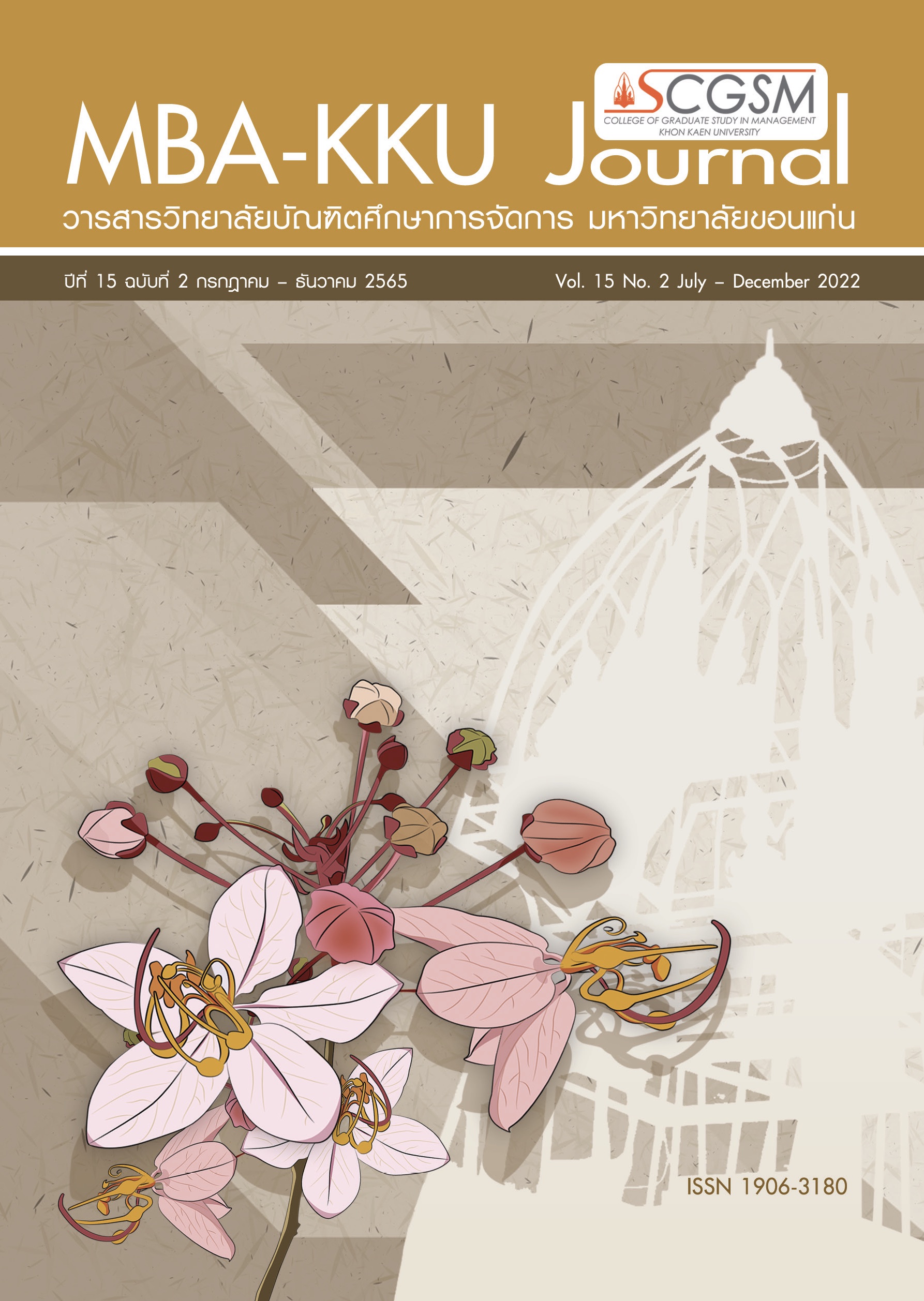Future and Trends of Virtual Events in Thailand
Main Article Content
Abstract
This study examined the future and trends of a virtual event business in the “new normal” situation in Thailand by using qualitative and quantitative research methods. The objectives of this study were to 1) study the current situation of a virtual event business in Thailand, 2) study the results of virtual events, and 3) examine audience behavior through a virtual event platform. The results from the PEST analysis of the impact of politics, law, and economy showed their positive and negative influences on the virtual event business. Positive impacts were gained from the environments of society, culture, and technology. In this study, a virtual event platform (https://vconf.kku.ac.th) was developed and implemented in order to investigate user behavior. This platform was active from June 1, 2021, until March 27, 2022. The period of study was 9 months and 27 days. Nineteen events were generated via this platform, 15 in 2021 and 4 in 2022. There were four types of exhibitions: trade shows, MOU, meetings, and online events. The virtual events were attended by 20,406 participants: 31.69% via Safari in-app, 46.57% via IOS, and 73.26% directly through the event platform. The virtual events created similar enjoyment and engagement in customers as attending in-person events, indicating that physical events can be effectively executed virtually. Audiences still receive the necessary content without being physically present at the event and can join from their preferred location and time. The results of the study showed that virtual events could be a trend for future businesses. The live event business may likely transform into a virtual one, and all involved
parties should adapt to keep up with changing audience needs.
Article Details

This work is licensed under a Creative Commons Attribution-NonCommercial-NoDerivatives 4.0 International License.
- The ideas and opinions expressed in MBA-KKU Journal are those of the authors and not necessarily those of the editor.
- Copyright on any open access article in a journal published by MBA-KKU Journal
References
เกรียงไกร กาญจนะโภคิน. (2562). Hybrid Event Marketing. กรุงเทพฯ: ภาพพิมพ์.
ชูชัย สมิทธิไกร. (2556). พฤติกรรมผู้บริโภค. พิมพ์ครั้งที่ 3. กรุงเทพฯ: สำนักพิมพ์แห่งจุฬาลงกรณ์มหาวิทยาลัย.
ฐานเศรษฐกิจดิจิทัล. (2564, 15 ธันวาคม). เริ่มแล้วงานกาชาดออนไลน์ 2564. ค้นเมื่อ 20 ธันวาคม 2564, จาก https://www.thansettakij.com.
ทัชวรรณ โอภาสขจรเดช. (2559). ปัจจัยที่มีผลกระทบต่อความสำเร็จของการดำเนินงานธุรกิจอีเว้นท์ขนาดกลางและขนาดเล็ก. วิทยานิพนธ์ปริญญาวารสารศาสตร์มหาบัณฑิต สาขาวิชาการจัดการสื่อสารองค์กร บัณฑิตวิทยาลัย มหาวิทยาลัยธรรมศาสตร์.
ไทยโพสต์. (2564, 15 กรกฎาคม). เริ่มแล้ว บางกอก อินเตอร์เนชั่นแนล มอเตอร์โชว์ ครั้งที่ 41 จัดแสดงรถยนต์ตามรูปแบบ New Normal. ค้นเมื่อ 15 ธันวาคม 2564, จาก https://www.thaipost.net/main/detail/71519.
ผู้จัดการออนไลน์. (2564, 4 มิถุนายน). ดีพร้อมจัดงานมหกรรมแสดงสินค้าออนไลน์เชื่อม 140 ร้านค้า. ค้นเมื่อ 15 ธันวาคม 2564, จาก https://mgronline.com.
โพสต์ทูเดย์. (2565, 24 มกราคม). การเมืองป่วน-รัฐบาลไร้เสถียรภาพการขับเคลื่อนฟื้นฟูเศรษฐกิจจะสะดุดไหม. ค้นเมื่อ 31 มกราคม 2565, จาก https://www.posttoday.com/economy.
มนัญชยา มีนิสัย. (2564). การวางแผนธุรกิจร้านกาแฟ กรณีร้านกาแฟ M ในเขตอำเภอเมืองนครราชสีมา จังหวัดนครราชสีมา. การศึกษาอิสระปริญญาบริหารธุรกิจมหาบัณฑิต วิทยาลัยบัณฑิตศึกษาการจัดการ มหาวิทยาลัยขอนแก่น.
วสุรัตน์ บุษบา และปิติมา ดิศกุลเนติวิทย (2563). การศึกษาความเป็นไปได้ในการท าธุรกิจรับจัดอีเวนต์ส าหรับเขตภาคเหนือตอนล่าง 2. วารสารบริหารธุรกิจ มหาวิทยาลัยเชียงใหม่, 6(2) ,1-8.
สภาพัฒน์ฯ คาดเศรษฐกิจไทยปี 65 โต 4% ส่งออก-ร่ายจ่ายรัฐคือ ปัจจัยหนุน. (2565, 21 กุมภาพันธ์). ค้นเมื่อ 3 มีนาคม 2565, จาก https://www.bbc.com
สำนักงานการจัดประชุมและนิทรรศการ (องค์กรมหาชน). (2564). จัดงานเสมือนจริงอย่างไรให้ประสบความสำเร็จ. ค้นเมื่อ 1 กุมภาพันธ์ 2565, จาก https://intelligence.businessevents Thailand.com.
สำนักงานนวัตกรรมแห่งชาติ. (2565). มองอนาคต VIRTUAL EVENT พลิกธุรกิจด้วยโลกเสมือน. ค้นเมื่อ 1 กุมภาพันธ์ 2565, จาก https://www.nia.or.th/VirtualEvent.
สำนักงานเศรษฐกิจการคลัง. (2565). ประมาณการเศรษฐกิจไทยปี 2564 และ 2565. ค้นเมื่อ 1 กุมภาพันธ์ 2565, จาก
Aguilar, F. (1967). Scanning the Business Environment. New York: McMillan. อ้างถึงใน สุรีย์พร วังคะฮาต. (2561). การศึกษาความเป็นไปได้ในการลงทุนธุรกิจร้านอาหารและเครื่องดื่มผู้ไทสะออน บ้านคำชะอี จังหวัดมุกดาหาร. การศึกษาอิสระปริญญาบริหารธุรกิจมหาบัณฑิต วิทยาลัยบัณฑิตศึกษาการจัดการ มหาวิทยาลัยขอนแก่น.
Chen, C. C., and Lin, Y. C. (2018). What drives live-stream usage intention? The perspectives of flow, entertainment, social interaction, and endorsement. Telematics and Informatics, 35(1), 293-303.
Google, Temasek and Bain. (2021). e-Conomy SEA 2021 Roaring 20s: The SEA Digital Decade.
Grand View Research. (2020). Global Virtual Events Market Size Industry Report 2020-2027. Retrieved
December 10, https://www.reserachandmarkets.com/Reports.
Marketingoops. (2564). ทรุดหนักในรอบ23 ปีเมื่อ ธุรกิจอีเวนต์ เจอสึนามิ โควิด19 ถล่ม. ค้นเมื่อ 10 ธันวาคม 2564, จาก https://www.marketingoops.com
Porter, M.E. (2008). The Five competitive Forces that Shapes Strategy. Harvard Business Review, 86(1), 78-93.
Solaris, J. (2020). Virtual Events Need a Better Business Model. Retrieved January 15, 2022, from
https://www.meetings.skift.com.
Vileta, J. (2016). PESTEL ANALYSIS. Upper Saddle River, NJ: Prentice Hall.


